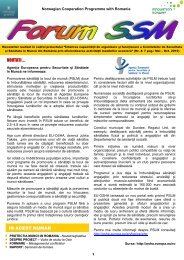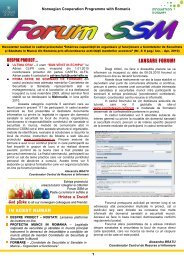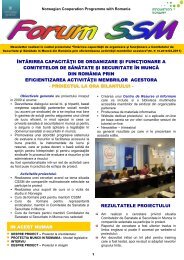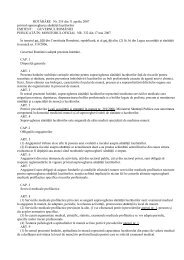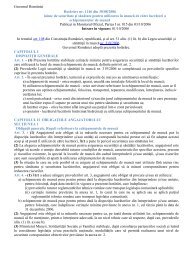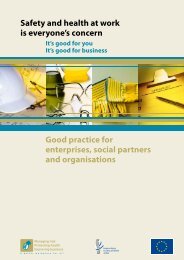Preventing work-related musculoskeletal disorders - European ...
Preventing work-related musculoskeletal disorders - European ...
Preventing work-related musculoskeletal disorders - European ...
Create successful ePaper yourself
Turn your PDF publications into a flip-book with our unique Google optimized e-Paper software.
<strong>Preventing</strong> <strong>work</strong>-<strong>related</strong> <strong>musculoskeletal</strong> <strong>disorders</strong><br />
THE EUROPEAN WEEK HAS SEEN A WIDE VARIETY OF ACTIVITIES TAKING PLACE RIGHT ACROSS THE EUROPEAN UNION AND<br />
BEYOND. BY REPORTING ON SOME OF WHAT’S BEEN HAPPENING IN SEVEN OF THESE COUNTRIES WE AIM TO GIVE YOU A TASTE<br />
OF WHAT THE WEEK HAS BEEN ALL ABOUT.<br />
FRANCE<br />
A practical training course on MSDs for managers was one of four<br />
projects that received Agency funding in France.<br />
Mr Jean Pierre Carrière, an engineer specialising in health and safety<br />
with the Caisse Régionale d’Assurance Maladie des Pays de la Loire<br />
(CRAM), says that the number of MSDs in the Pays de la Loire has<br />
been sharply increasing for the past four or five years. “We have<br />
now to put on the market a solution to stop the diseases, to improve<br />
prevention of <strong>musculoskeletal</strong> <strong>disorders</strong>.”<br />
CRAM now offers training to managers with authority to effect<br />
changes in factories and other <strong>work</strong>places so that people can deal<br />
with MSDs in their <strong>work</strong>place. The training course of six days is<br />
spread over four months. For three consecutive days participants are<br />
presented with information about MSDs and the project in hand is<br />
explained. Participants return to their <strong>work</strong>places with a view to<br />
putting into effect what they have learned.<br />
The fourth day of the course takes place several weeks later, which<br />
involves an update on progress to date; while the last two days some<br />
weeks later finalise the project. “They do a draft project and they<br />
come back and discuss the project with us. We follow up the draft<br />
project until it’s ended,” he says.<br />
Moreover, the participants’ projects will be followed up next year in<br />
2001 to evaluate further progress, whether developments are<br />
unfolding or if targets have been met.<br />
Mr Carrière says the course is a new idea, “doing training courses<br />
for people in factories who are able to improve the prevention on<br />
the factory <strong>work</strong> floor”.<br />
Asked if a lot of managers in France would not be trained about<br />
MSDs, he says: “No, not in France. They are not informed of the<br />
problem of <strong>musculoskeletal</strong> <strong>disorders</strong>. We have to speak to the<br />
managers and tell them of the importance of these kind of<br />
diseases.”<br />
The first course, which involved participants from the metal<strong>work</strong>,<br />
electricity and telecommunication industries, took place from March<br />
to May 2000, while a second course was planned from October to<br />
December 2000. A further three courses are planned for 2001.<br />
For further information contact: Frédéric Leonzi, Ministère de<br />
l´Emploi et de la Solidarité -Direction des Relations du Travail<br />
Bureau CT 1-2, email: frederic.leonzi@drt.travail.gouv.fr, websites:<br />
http://www.travail.gouv.fr or http://fr.osha.eu.int<br />
ITALY<br />
Italy held a conference in Modena on 20 September 2000 on <strong>work</strong><strong>related</strong><br />
upper limb <strong>disorders</strong>. Invited speakers came mainly from<br />
companies with experience in risk assessment, in the re-design of<br />
<strong>work</strong>places and the re-employment of <strong>work</strong>ers with WRULDs, such<br />
as Whirlpool, Electrolux, Embraco, and Emerson.<br />
A book La Valutazione E La Gestione Del Rischio Da Movimenti E<br />
Sforzi Ripetuti Degli Arti Superiori (Evaluation and Management of<br />
Risk by Repetititve Movements of the Upper Limbs) which presents<br />
new guidelines was launched and distributed. Written by Daniela<br />
Colombini et al, the guidelines offer easy-to-use risk assessment<br />
methods to industrial technicians in designing or re-designing<br />
<strong>work</strong>places to prevent MSDs.<br />
Writing the foreword to the guidelines, Prof. Antonio Grieco says<br />
the book was chiefly written for the men and women “who design,<br />
implement, inspect, assess and modify the times and methods with<br />
which certain jobs are performed in a manufacturing environment,<br />
based on their own professional expertise and experience”.<br />
A leaflet presenting health information to <strong>work</strong>ers exposed to<br />
repetitive tasks was also distributed.<br />
In October, a two-day meeting in Rome covered the prevention of<br />
<strong>musculoskeletal</strong> <strong>disorders</strong> for repetitive movements, manual<br />
handling and when handling hospital patients. Speakers shared their<br />
practical experiences in risk assessment, prevention and health<br />
education. The book and leaflet were distributed here too.<br />
This winter and in spring 2001, the EPM (Ergonomia della Postura e<br />
del Movimento) research unit is organising nine two-day courses for<br />
company technicians in different Italian regions, north and south.<br />
Courses look at the prevention of WRULDs, risk assessment of<br />
manual handling tasks and the prevention of low back pain.<br />
For further information: ISPESL, Dipartimento Documentazione,<br />
Informazione e Formazione, website: http://www.ispesl.it or URL:<br />
http://it.osha.eu.int<br />
AUSTRIA<br />
Austria has two projects cofunded by the Agency for <strong>European</strong><br />
Week 2000.<br />
“Be clever with going back”, under the auspices of the Allgemeine<br />
Unfallversicherungsanstalt, the Austrian <strong>work</strong>ers’ compensation<br />
board, aims to raise awareness of MSD risks and to encourage<br />
measures to deal with the problem. The information campaign is<br />
directed at small and medium sized enterprises through brochures,<br />
posters and videos.<br />
The project deals with topics like manual handling of heavy loads,<br />
repetitive strain injuries, healthy behaviour, <strong>work</strong> organisation, <strong>work</strong><br />
processes, how to design healthy <strong>work</strong>places, and includes practical<br />
help and tips.<br />
The second project is called InForm: What supports me! What moves<br />
me! Impulses to posture and movement, being run by LIFE, Institut<br />
für Gesundheitsentwicklung and Human-ware, Institut für<br />
Gesundheit, Sicherheit und Ergonomie im Betrieb It aims to educate<br />
a wide range of people, especially employed people and students,<br />
about <strong>musculoskeletal</strong> stress factors and potential complaints.<br />
The campaign includes a <strong>work</strong>book and a poster. A checklist enables<br />
employees to evaluate their own <strong>work</strong>place for MSD risks. It includes<br />
<strong>European</strong> Agency for Safety and Health at Work<br />
33



